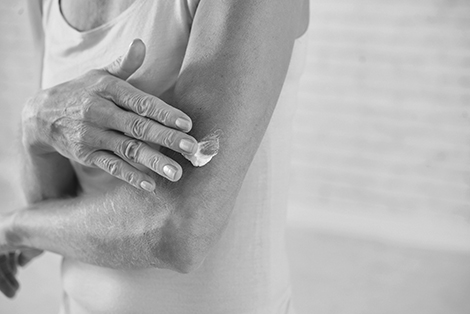Aging is a fact of life, and your skin is no exception. However, experts say that there is a lot you can do to help your skin at all stages of life.
“By spotting signs that your skin is maturing, you can take steps to intervene early, helping skin stay as healthy and youthful looking as possible,†says Dr. Roger Ceilley, a nationally recognized dermatologist with over 30 years of experience.
To tackle age-related skin issues, Ceilley recommend:
- Around age 40, begin examining your skin for changes. You’ll get a better understanding of your skin’s specific needs so you can address them accordingly. Be careful not to focus only on the face, as you may wind up playing catch-up with the rest of your skin late in the maturing process.
- The levels of collagen, elastin and fatty tissue important for making skin appear plump and youthful begin to diminish as you age, causing thinner-looking skin. Help counteract this process with a moisturizing cream or lotion that contains skin-nurturing ingredients like hyaluronic acid, retinol, glycolic acid and niacinamide.
- A well-balanced diet promotes healthy, younger-looking skin. Make sure you are eating plenty of fruits and vegetables, lean proteins, and healthy fats each day.
- Thin, fragile skin can bruise more easily. Medications such as blood thinners may leave skin especially vulnerable to bruising. To help, keep a product on-hand which contains a blend of ceramides, alpha hydroxy acid, arnica oil and retinol.
- Use gentle, unscented products when bathing or showering. Scented soaps, cleansers and alcohol-based products can leave aging skin feeling irritated and dry. Wash gently and avoid scrubbing or over-exfoliating, as this can further irritate the skin.
- Itchy skin is not only a nuisance, but it can keep you from being comfortable and prevent a good night’s sleep, which can be detrimental to one’s health at any age. Itchiness is a common problem in maturing skin. To temporarily relieve discomfort, use a steroid-free, anti-itch product containing pramoxine hydrochloride 1 percent.
- Protect your skin from the sun and use sunscreen with SPF 50 or higher. Sun exposure throughout your lifetime can cause a myriad of skin problems as you get older including skin cancer, deep wrinkles, thinning skin, dark spots and broken capillary veins.
“Your skincare should be specific to your needs,†says Ceilley. “Watch for signs of aging and then adopt a routine that addresses every inch of your skin.â€

(DragonImages/stock.Adobe.com)